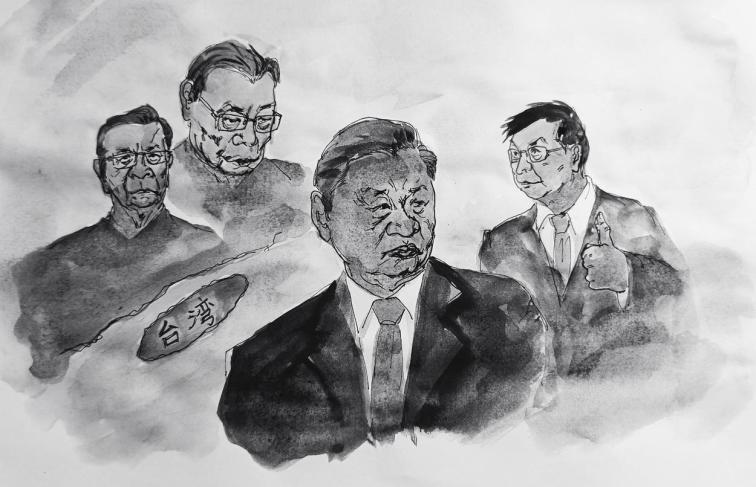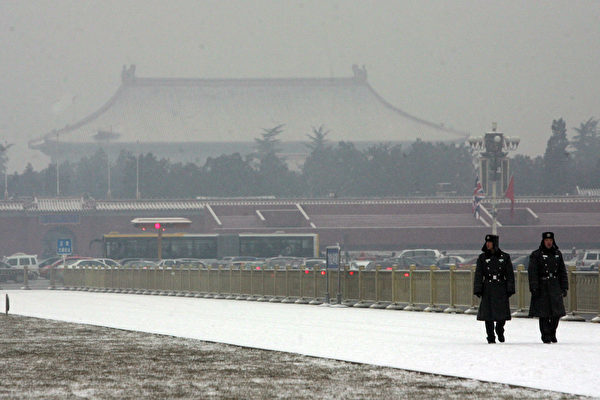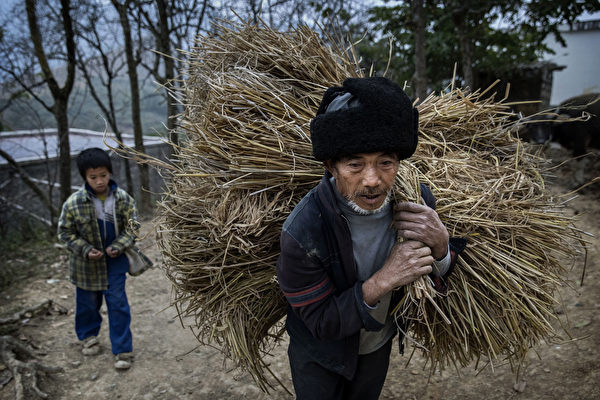Dark clouds hang over Tiananmen Square in Beijing. (Lintao Zhang/Getty Images)
[People News] A fax from Zhongnanhai, released by Wu Man Shan:
The Fourth Plenary Session is set to convene in September. Who will flourish after the flowers fade? Will it be a fragrant scent or a city drenched in blood? This is crucial for the fate of the Party and the nation.
Brother Man Shan,
I’ve noticed on foreign online platforms that many media figures are quite optimistic. While it’s true that the major upheaval is beginning to present opportunities, we should temper our optimism.
Trump is not only unable to come to Beijing, but there’s also no chance for a phone call with Xi. Naturally, Xi cannot confront Trump’s fierce attacks directly, partly because he fears that something might go wrong during a live encounter, which would be a significant loss of face.
Putin’s visit to Beijing is intended to bolster Xi. As long as Xi remains in power, China and Russia will be allies without limits. Whether Xi steps down at the Fourth Plenary Session is more critical for the Russia-Ukraine war. If the Fourth Plenary formally confirms Xi’s departure, whether he resigns immediately or steps down later, it will have a devastating impact on China-Russia relations.
It’s surprising that Trump is unaware of these changes in Zhongnanhai, indicating that the U.S. only considers trade and military aspects regarding China, lacking insight into the shifts occurring within Zhongnanhai. It’s likely that the informants have indeed been dealt with by the Communist Party.
Putin’s visit primarily aims to encourage Xi to take advantage of the time window. Before the most advanced American weapons are fully developed and deployed, he should initiate a blitzkrieg against Taiwan, with Russia providing necessary support. Perhaps Putin believes that if two major wars erupt simultaneously, the U.S. is less likely to intervene directly.
Xi has become ensnared in Putin's political machinations, with the Russian leader firmly backing him to stay in power, at least maintaining his role as Chairman of the Military Commission to ensure continued support for Russia. Should Xi waver or resign, Putin would likely take aggressive actions against China or align with the United States to secure national interests. This is particularly relevant as Trump is keen to target the Chinese Communist Party, and Russia no longer poses a significant threat to the West, especially the U.S.
Xi Jinping is in a precarious position, akin to riding a bear.
The significant changes orchestrated by the elders have been in motion for nearly a year, and this transformation is evident to all, so there is no need for further elaboration.
The current uncertainty lies in Xi's relentless pursuit to alter the Beidaihe consensus at any cost and to reclaim his absolute authority, despite the considerable risks that could lead to internal strife and military conflict. It remains unclear how Putin will support him and how he might manoeuvre during the Fourth Plenary Session, similar to how he manipulated Hu Jintao at the 20th National Congress; this reflects the treacherous and opaque nature of political manoeuvring.
The shared understanding between the elders and Xi consists of two main points: first, the need to establish a new central leadership team and nurture the next generation of leadership collectives. It is crucial to emphasise that this is a collective leadership, and no individual can be singled out as the leader or core figure; the focus is on collective governance. Second, individuals from various regions and factions should be included in the leadership collective to ensure political balance and stability.
Xi's predicament is underscored by several factors:
Firstly, following health issues, his condition has been inconsistent, and his emotional state is unstable. Currently, he primarily engages in performative visits or receptions for foreign dignitaries, with power increasingly shared among the members of the Standing Committee.
Secondly, the military has undergone significant purges, making it challenging to establish a united front for warfare. Large-scale joint operations have never been conducted, and suddenly coordinating hundreds of thousands of troops from land, sea, and air, along with information units in the Taiwan Strait, would be a daunting task. If the U.S. military were to engage, it could easily result in total annihilation. The most pressing concern is that if communication networks or power supplies are disrupted or fail during wartime, all soldiers and equipment would be left stranded on the shore or at sea, waiting to become cannon fodder.
Thirdly, public sentiment is changing, and absolute loyalty is becoming a thing of the past. Cai Qi (Cài Qí) is a perceptive individual. His initial unwavering loyalty stemmed from gratitude and a desire to achieve significant goals together. However, he differs from the members of the Gang of Four; he was groomed as a cadre during the southern reform and opening-up era. Xi Jinping (Xí Jìnpíng) has undermined these reforms, and Cai understands that absolute loyalty equates to absolute wrongdoing. If this situation persists, his fate could be worse than that of Liu Shaoqi (Liú Shàoqǐ). Furthermore, two senior officials have had serious discussions with him, urging him to consider the party and the nation and to adopt a broader perspective. It is reported that he was moved to tears during these conversations, demonstrating his respect for the elders' views, and acknowledging that the consensus reached at Beidaihe must not be altered.
Cai Qi has recently been using his poor health and severe sleep issues as reasons to avoid accompanying Xi on inspections, and he is beginning to contemplate retirement.
Peng Liyuan (Péng Lìyuán) is not as malevolent as Jiang Qing (Jiāng Qīng), nor does she harbour ambitions for power. She is fully aware of the current situation, having witnessed numerous significant events last year. Additionally, her daughter has shared insights about the domestic and international realities, prompting her to voluntarily withdraw from her special military status. Previously, she held some recommendation and inspection rights, but she has chosen to step back. Now, she only makes appearances to show support when accompanying the spouses of foreign heads of state.
Wang Huning, grateful for Xi's recognition, continues to show Xi respect. The architect of Xi's ideology has stopped writing and planning; has anyone noticed that since last year, Xi has not introduced any new ideas? Major websites are filled with retrospectives of Xi's past statements, reminiscent of nostalgia. Currently, Wang, as a member of the Standing Committee, is primarily responsible for United Front work. His grand vision is that America opposes itself, the West opposes itself, and Taiwan opposes itself, and then the Chinese Dream will have hope. However, he did not foresee that after twelve years under Xi, everything has unravel, and the entire country is in a state of irreversible collapse. He plays a neutral role within Zhongnanhai.
Zhao Leji has had conflicts with Xi because he did not cooperate with Xi on significant matters at the National People's Congress. It is reported that during wartime martial law, the entire country is under military control, and the National People's Congress is simply uncooperative. Xi successfully amended the constitution and secured re-election. If Xi can be empowered by the National People's Congress to implement nationwide martial law or military control before a potential war with Taiwan, then wartime laws could grant him a level of power even greater than Mao's totalitarianism, where no one is safe. Who would want to engage in this unwinnable war? The country is already in disarray, and another senseless conflict could turn Zhongnanhai into a raging inferno at any moment.
Xi's re-election, as he claims, is aimed at liberating Taiwan and fulfilling the great dream and mission of national unification. If Xi cannot secure re-election, military unification with Taiwan will not occur, and the Taiwan Strait crisis will resolve itself.
It seems that the influence of another faction within the Chinese Communist Party has prompted Trump to make demands regarding Taiwan, while Lai Ching-te has conveyed a message of friendliness and goodwill towards the mainland. He is not aggressively pursuing Taiwan's independence and is avoiding provoking the CCP, which leaves Xi Jinping without a pretext to seek justification for his continued re-election during the Fourth Plenary Session. This is evident from related news, indicating that President Lai of Taiwan is still aligning with Trump's preferences.
The Fourth Plenary Session is crucial for the nation's destiny; in uncertain times, anything can happen.
Good night. 2025-5-21
(Originally shared from Wu Zuolai's tweet)










News magazine bootstrap themes!
I like this themes, fast loading and look profesional
Thank you Carlos!
You're welcome!
Please support me with give positive rating!
Yes Sure!